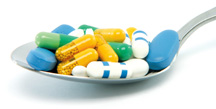Antibiotics Don't Work for Cold Symptoms
But Many Doctors Still Prescribe Them
By Editorial Staff
According to a recent study published in the British medical journal
Lancet, about a third of patients who go to their doctor for upper respiratory tract infections (URIs) are diagnosed with acute rhinosinusitis, and 80 percent of those patients receive antibiotics, even though doctors don't have clear criteria for distinguishing between viral and bacterial infections.
Why is this an important distinction? It's important because while bacterial infections can be treated with antibiotics, viral infections cannot. If you take antibiotics for a viral infection, they won't help and actually might harm you. The Centers for Disease Control emphasizes this very point on its Web site:
"Are you aware that colds, flu, most sore throats, and bronchitis are caused by viruses? Did you know that antibiotics do not help fight viruses? It's true. Plus, taking antibiotics when you have a virus may do more harm than good. Taking antibiotics when they are not needed increases your risk of getting an infection later that resists antibiotic treatment."
 The Lancet study involved 2,547 adults with clinical signs and symptoms of rhinosinusitis (nasal discharge, discomfort in the cheeks and/or face, cough, cold). The researchers determined that guidelines suggesting antibiotics be administered after seven days of symptoms were not supported by the evidence. They concluded that in general, adults diagnosed with acute rhinosinusitis should not receive antibiotics regardless of their symptoms due to the risks for adverse side effects and increased antimicrobial resistance.
The Lancet study involved 2,547 adults with clinical signs and symptoms of rhinosinusitis (nasal discharge, discomfort in the cheeks and/or face, cough, cold). The researchers determined that guidelines suggesting antibiotics be administered after seven days of symptoms were not supported by the evidence. They concluded that in general, adults diagnosed with acute rhinosinusitis should not receive antibiotics regardless of their symptoms due to the risks for adverse side effects and increased antimicrobial resistance.
No one enjoys being sick, but antibiotics aren't the answer, particularly for common URIs and cold symptoms. While cold symptoms aren't pleasant to endure, mom's homemade remedies of chicken soup, vitamins and fluids will be more effective and a lot less risky.

